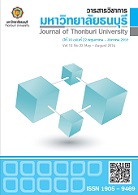การยอมรับและการพัฒนานโยบายเครื่องดื่มแอลกอฮอล์
Keywords:
นโยบายเครื่องดื่มแอลกอฮอล์, การยอมรับการดื่มแอลกอฮอล์, นโยบายบังคับใช้ในระดับชุมชน, Alcoholic policy, Alcoholic consumption acceptance, Community’s enforcement,Abstract
การวิจัยนี้มีวัตถุประสงค์เพื่อศึกษาการยอมรับนโยบายควบคุมเครื่องดื่มแอลกอฮอล์ และนโยบายบังคับใช้เครื่องดื่มแอลกอฮอล์ ในนโยบายทางกฎหมายและชุมชนสำหรับการควบคุมการบริโภคของผู้นำชุมชน ตำรวจ หัวหน้าส่วนราชการในระดับท้องถิ่น และประชาชน ในพื้นที่กรุงเทพมหานคร เชียงใหม่ ชุมพร และสุรินทร์
งานวิจัยนี้ใช้ระเบียบวิธีวิจัยแบบผสาน (Mix Methodology) โดยเริ่มต้นด้วยการวิจัยเชิงปริมาณ กลุ่มตัวอย่าง มีจำนวน 1,600 คน อายุ 18-24 ปี ใช้วิธีการสุ่มแบบ Multi-Stage Sampling จากนั้นผสานด้วยวิธีการเชิงคุณภาพโดยการสัมภาษณ์เชิงลึก (In-depth-Interview) และการสนทนากลุ่ม (Focus group) ด้วยการสุ่มตัวอย่างแบบง่าย (Simple random sampling) ทั้งสิ้น 120 คน โดยการสุ่มเลือกจากหน่วยงานภาครัฐและเอกชนที่เกี่ยวข้องกับการควบคุมเครื่องดื่มแอลกอฮอล์ ร้านค้าผู้ประกอบการ และชุมชนที่ดำเนินโครงการรณรงค์ลดการบริโภคเครื่องดื่มแอลกอฮอล์ สถิติที่ใช้วิเคราะห์ข้อมูล ได้แก่ การแจกแจงความถี่ ค่าเฉลี่ย ร้อยละ ค่าเบี่ยงเบนมาตรฐาน และการตีความจากการวิจัยเชิงคุณภาพ
ผลการวิจัยได้ข้อสรุปว่า กลุ่มตัวอย่างที่ศึกษาส่วนใหญ่มีพฤติกรรมดื่มแอลกอฮอล์เพื่อสังคมมากที่สุด และยอมรับนโยบายควบคุมเครื่องดื่มแอลกอฮอล์ในระดับมากที่สุดในทุกมาตรการ โดยนโยบายควบคุมการโฆษณามีการยอมรับมากที่สุด รองลงมาคือ นโยบายควบคุมการดื่ม หรือการจำหน่าย ส่วนนโยบายที่ยอมรับน้อยที่สุด คือ นโยบายควบคุมผู้ซื้อผู้ขาย สำหรับนโยบายบังคับใช้ในระดับชุมชน มีทั้งนโยบายระดับบุคคล ครอบครัว และชุมชน ได้ข้อสรุป 4 นโยบาย คือ 1) ยอมรับนโยบายควบคุมการโฆษณาเครื่องดื่มแอลกอฮอล์ 2) ยอมรับนโยบายควบคุมการดื่ม หรือจำหน่าย 3) ยอมรับนโยบายทางภาษี และ 4) ยอมรับการควบคุมการดื่มแอลกอฮอล์ในเยาวชนACCEPTANCE AND DEVELOPMETN OF ALCOHOLIC POLICY
This research aims to investigate alcoholic policy acceptance, law enforcement and community measures to restrict alcohol consumption in Bangkok, Chaingmai, Chumporn, and Surin provinces. Sampling population are; 1) Quantitative method: Multi-Stage Sampling technique was performed to 1,600 people, age between 18-24 year olds; 2) Qualitative method: in-depth interview was executed to 40 samples whereas the focus group interview was operated to 80 samples. Simple Random Sampling technique is functioned to related government departments, private agencies, alcohol liquid retailers and communities that run the alcohol consumption restriction campaign. Descriptive analysis was employed to analyze the data –frequencies, mean, percentage and standard deviation. The result found that the majority of respondents consumes alcohol liquid due mostly to socialize purpose and tends to accept all alcohol-restricted measures at the maximum level. The highest acceptant measure is advertising while the lowest one is restriction to alcohol liquid retailers. At community level, the findings suggest four measures: 1) Measure to restrict alcoholic consumption, 2) Measure to limit the selling of alcohol liquid, 3) Measure to alcoholic taxation, and 4) Measure to restrict alcoholic consumption for the youth.







